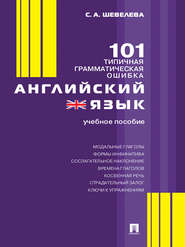скачать книгу бесплатно
much trouble/time/information/money.
Note: Словоmuchтакже употребляется как наречие и существительное, например: to read/to speak/to walkmuch.
23-1. Read and translate the sentences.
1. It's never a good idea to make too many changes at one time.
2. There aren't as many opportunities as they thought.
3. There have been so many changes since our last trip together.
4. I don't know many of your friends.
5. Too much time is wasted on planning projects which never actually happen.
6. They're very helpful. Nothing is too much trouble for them.
7. How much money has he got?
8. I haven't eaten much.
9. He didn't say much.
10. How much did he lose?
23-2. Use the right word (many or much), and translate the sentences.
1. I haven't got… time.
2. How… people were present?
3. There aren't… large glasses here.
4. There wasn't… food in the refrigerator.
5… people think it's time for a change.
6…. has been written about unemployment.
7… stories have been told about various adventures.
8. I know that… economists doubt this figure.
9. Do you work… at weekends?
10. She made too… mistakes in the test.
23-3. Translate into English.
1) много людей
2) много времени
3) много ошибок
4) много денег
5) много сведений
6) многие экономисты
7) многие художники
8) многие артисты
9) сказать многое
10) написать многое
24. Few – little
Местоимение fewмало употребляется с исчисляемыми существительными, littleмало – с неисчисляемыми существительными или самостоятельно:
few books/cities/countries/people
little trouble/time/information/money
Note: Словоlittleтакже употребляется как наречие и существительное, например: to read/to speak/to walklittle.
24-1. Read and translate the sentences.
1. At that time very few people realized the true significance of the discovery.
2. Few names remained in his memory.
3. He has a large library, but very few books on the subject that interests you.
4. There was little soup left.
5. I must say there is little to be added.
6. There is very little sense in what he is saying.
7. She has very little time for reading.
8. I know little of this man. Practically nothing.
9. It's very strange that the writer is little known in this country.
10. It's a pity he is little read.
24-2. Use the right word (few or little), and translate the sentences.
1. He has got very… English books.
2. I can't say he reads…
3. I'm sorry I have got very… spare time.
4. He spends very… money on clothes.
5. She travels very… these days.
6. I have… interest in politics.
7… politicians are honest.
8…. people can say that they always tell the truth.
9. Cactuses need… water.
10. His ideas are difficult, and… students understand him.
24-3. Translate into English.
1) мало народа
2) мало денег
3) мало времени
4) мало воды
5) мало новых идей
6) мало путешествовать
7) мало работать
8) мало зарабатывать
9) мало хороших фильмов
10) знать очень мало
25. A few – a little
Местоимение a fewнесколько, немного употребляется с исчисляемыми существительными, littleнемного – с неисчисляемыми существительными или самостоятельно:
a few books/cities/countries/people
a little trouble/time/information/money
Note: Словоa littleтакже употребляется как наречие и существительное, например: to read/to speak/to walka little.
25-1. Read and translate the sentences.
1. I would like to make a few remarks.
2. There are a few books of this author in the library. You may borrow one now.
3. A few weeks from now he will be far away.
4. Only a few of the children in this class like physics.
5. A few people went to the forest, but most people headed straight for the river.
6. She knows German a little.
7. Adam displays not a little interest in the subject.
8. Could I try a little salad?
9. Would you like a little soup?
10. Give the roses a little water every day.
25-2. Use the right word (a few or a little), and translate the sentences.
1…. years ago he visited New Zealand.
2. We had… bacon and eggs.
3. Only… children like mathematics.
4. I'm glad he has… patience with me.
5. There were only… cars on the road.
6. We still had… hope.
7. They didn't need to go shopping. They had… potatoes and some steak.
8. Only… people speak a foreign language perfectly.
9. He made… mistakes in the dictation.
10. I had… questions to ask the speaker.
